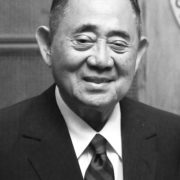(Part 2 of 2)
We were then a young aggressive entrepreneur, and decided to bid as prime contractor for the Port of Jeddah, the largest then in the Arab world, which was opened for bidding to manage the port, Saudi Arabia’s main entry point in the Red Sea. We had signed a joint venture agreement with the Singapore Port Authority, and created the Philippines-Singapore Ports Corporation, which was quite successful. We won the bid, acquired a large ship without engine in the Port of Piraeus in Greece, and had it towed across the Aegean Sea and into the Suez Canal and into Jeddah. As we had written before, the vessel arrived in Jeddah in early morning as some ten commercial 707 jets just flew in from Manila with stevedores and port executives for immediate deployment in the Jeddah port.
We won the bid for the Jeddah port, not because we were the best but the big port operators from the U.S., U.K., Italy, South Korea, and Japan could only start operations in Jeddah after two years since they first had to build permanent housing barracks for their large workforce.
We outwitted them and won the bid by promising to start operations soonest with our 3,000 Filipino stevedores and an array of Filipino, Singaporean, and English port executives, backed by our multi-million bid bonds and performance bonds following stiff international competition.
After a few weeks our ship, the largest pre-war luxury liner, renamed the Villa Magna by the Greeks, docked in Piraeus, Greece, without engine, was pulled by giant tugboats we hired from the Netherlands, crossed the Suez Canal and into the Red Sea to our cheering employees, 3,000 stevedores from the Philippines, to our port of destination, Jeddah.
The project was so successful that the Saudi Government this time awarded to us without further bidding our second port, the Port of Jubail in the Persian Gulf or Arab Gulf to the Arabs, on the other side of the peninsula.
Perhaps the rest is history and after our successful projects in Jeddah and Jubail, smaller O&M projects in Gizan also off the Arab desert, housing projects in Kuwait, smaller projects in Iraq’s Basrah and Baghdad, we ended our Arab journey after striking oil in Ajman, the United Arab Emirates, where we — Basic Energy and Landoil — brought our own oil rig which we leased from Andres Soriano’s PODCO in the Philippines.
Drilling was supervised by the late experienced Mario Nieto of Isabela whom we engaged as drilling superintendent. The drilling location was chosen by our Dr. Fran Gidson, the celebrated Amrican who helped discover in earlier days the giant oil field in Iraq and a celebrated geologist.
We organized the drilling and raised drilling funds from our Arab friends and our subscribers from the Philippines and we had a substantial oil strike in Ajman, one of the smallest Emirates in the UAE, the United Arab Emirates, whose most popular centers are Dubai and the capital Abu Dhabi, where overall we have today perhaps more than two million Filipinos in the Arab world since our pioneering days from the mid-1970s to the 80s.
Our successful ventures in the Arab world came to a close with the Iran-Iraq war as we had to close shop with significant losses and then we had to come home to return to our old love, run for public office in the Philippines, after the end of Martial Law.
Last week, as we boarded the plane in Qatar, we envisioned going back to the Middle East and talk to the rulers of Ajman and the UAE about perhaps allowing us to redrill our old well there and adding new wells to establish our oilfield, beginning with the first oil well we drilled there which was a success. This may be difficult to accomplish now but who knows. We are still active with Basic Energy in the Philippines with brother Oscar and nephew Carey de Venecia and son Joey III. They have small projects in Myanmar, Thailand, and Japan with major Thai partners.
We do not know how to go about it now, but after almost 40 years, we could inquire and try.
For our return home from France, instead of flying to London from Paris to catch the direct Philippine Airlines London-Manila non-stop flight, we decided to take the return flight home via the Arab route, in Qatar along the Persian Gulf, Arab Gulf to the Arabs, despite the dangerous tensions in the Gulf region. The week before, rockets destroyed some of Saudi Arabia’s richest oil fields, hit by missiles from Yemen or Iraq but suspected by Saudis as fired from Iran.
There will be many charges and counter-charges from both sides of the Gulf. Last week there were missed opportunities for U.S. President Donald Trump and Iran President Hassan Rouhani to meet at the U.N. General Assembly.
We believe the U.N. Secretary General and the President of France or Chancellor of Germany could take the lead in initiating negotiations, with say, Asian counterparts, from India, Japan or ASEAN to restrain the Iranians, the Saudis, and the U.S. to help put an end to the crisis in the Gulf which threatens more than 50% of the world’s petroleum supply which include the bulk of Philippines’ oil imports.
The Catholics and Protestants of Europe, after decades of conflict and bloodshed, following the Biblical days in Israel had long reconciled and live in peace. The Sunnis led by Saudi Arabia and the Shiites led by Iran, both followers of Islam, should likewise reconcile, keep their beliefs, until in God’s chosen time, like the Catholics and Protestants at least reconcile, and unite as one family under God.
The U.N. Secretary General Antonio Gutierres, French President Emmanuel Macron, German Chancellor Angela Merkel, an ASEAN leader-designate, a Chinese or Russian representative should get-together and journey to Tehran and Riyadh to set a sustained peace process in motion until the work is done.






